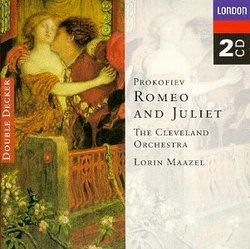| All Artists: Sergey Prokofiev, Lorin Maazel, Cleveland Orchestra Title: Prokofiev: Romeo and Juliet Members Wishing: 0 Total Copies: 0 Label: Decca Release Date: 6/9/1998 Genre: Classical Styles: Ballets & Dances, Ballets, Historical Periods, Modern, 20th, & 21st Century, Symphonies Number of Discs: 2 SwapaCD Credits: 2 UPC: 028945297026 |
Search - Sergey Prokofiev, Lorin Maazel, Cleveland Orchestra :: Prokofiev: Romeo and Juliet
 | Sergey Prokofiev, Lorin Maazel, Cleveland Orchestra Prokofiev: Romeo and Juliet Genre: Classical
By the time Prokoviev came to write this great ballet in 1935, Russia was the only country that still had a tradition of "classical" ballet--that is, full-length works of several hours with a single coherent story line. ... more » |
Larger Image |
CD DetailsSynopsis
Amazon.com essential recording By the time Prokoviev came to write this great ballet in 1935, Russia was the only country that still had a tradition of "classical" ballet--that is, full-length works of several hours with a single coherent story line. Prokofiev's model was Tchaikovsky, and like his predecessor, he encountered severe problems getting the work produced. The dancers thought the music too complicated and unsuitable for dancing, and so the piece was first performed in Czechoslovakia, only later making a triumphant stage debut at the Bolshoi. It has never been out of the repertoire since. This recording set a new standard of orchestral excellence in performance of this music, and is still the version of choice for the complete ballet. --David Hurwitz Similarly Requested CDs
|
CD ReviewsWonderful in its own way Ray Barnes | Surrey, British Columbia Canada | 04/18/2000 (5 out of 5 stars) "I am fortunate to have copies of both the Maazel and the Previn sets of this ballet and can recommend them without reservation. At the risk of over-generalizing, the Maazel is very crisp, rythmic, and incisive; and the Previn is more affectionate, sentimentalized and perhaps symphonic. I find the former reading would work better in a live ballet presentation (having seen it twice) and the latter might be more appropriate for the concert hall. The Cleveland Orchestra plays brilliantly. The famous balcony scene draws a fervent response from the strings, especially the cello and viola section. The Death of Tybalt will give your speakers quite a work-out. The finale, with a very firm tempo, is quite shattering in its intensity. The recorded sound is excellent, as is the documentation. This can be enthusiastically recommended alongside the Previn and in preference to the Russian alternatives, which are not as well played." The very best version of Prokofiev's Romeo and Juliet A. Leung | Hong Kong SAR | 09/22/2004 (5 out of 5 stars) "This classic account of Prokofiev's perennially engaging ballet is the best rendition currently available. Maazel may not be as renowned a Prokofievian as, say, Gergiev, Weller, Jarvi, Rozhdestvensky, Kuchar, or even Ozawa, but he delivers an exemplary performance here that has stood the test of time for more than three decades. On matters of interpretation, Maazel strikes the perfect balance between metrical precision and romantic indulgence. Ashkenazy exemplifies the former sternly disciplined and metronomic approach, whilst Previn adopts a more unfussy and sentimental take. Maazel is perhaps somewhat less passionate than Previn, resulting in a reading that is less 'popular' and filmic. At the same time, he is more flexible and attuned to the crests and troughs of the score than Ashkenazy, so the music is suitably imbued with warmth and emotion, though never to an excessive degree. Previn's conducting sometimes seems unnecessarily maudlin, though there are some incredibly poignant moments. Ashkenazy, who keeps to the score and delivers a performance that can be thrilling in its rhythmic intensity, could nonetheless do with a bit more give and take, a bit more sensitivity to the pulsing heart of the score. Maazel gives the listener the best of both worlds: he allows Prokofiev's ineffably beautiful melodic lines to swell and soar, but he also preserves cohesion by maintaining a sort of symphonic momentum. The Cleveland Orchestra performs magnificently under Maazel's baton. Renowned for their technical exactitude, they also make a case here for their ability to sing with eloquence and arduour. Their brass section, though marginally less emphatic than Previn's London Symphony band, is nonetheless a model of gusto and, importantly, lucidity. Similarly, Cleveland's string section is at once richly articulate and flawlessly transparent. Ashkenazy's Royal Philharmonic is a nonpareil in terms of exact execution, but Cleveland are the more intense ensemble. Happily, this recording gives us a delectable balance between emotional intensity and instrumental clarity. Maazel views the ballet not as an episodic sequence of shouts and whispers but as a coherent and adhesive long-line of melody. This is the product of a mind dedicated not to fleeting moments of sonority and drama but to the complete architecture of the composition. This was, after all, the first ever recording of the entire ballet, and it differed from recordings of the suite in that Maazel believed in the power of the entirety of the piece, not just its constituent chapters and episodes. This is, to my mind at least, the most sensible and effective method- what Prokofiev probably intended. To top things off, the clarity and impact of the recording belies its 70's vintage- the timpani rolls with thunderous authority, the strings are as lucent as crystal. The entire orchestra is made a deliciously tangible presence by the superbly remastered sound. That's the end of my two cents. Of course, Previn and Ashkenazy are well worth investigating if you want to look into the interpretative possibilities presented by this ballet. However, if you want just one recording of this glorious work, Maazel is a firm first-choice, and Decca's two for one price-tag makes this a bargain. An unreserved recommendation if there ever was one." A no-brainer recommendation Paul Bubny | Maplewood, NJ United States | 12/30/2003 (5 out of 5 stars) "A score this rich and bounteous can stand up to differing interpretations, and that is what you get from Lorin Maazel and Andre Previn. True fans of this ballet will have both recordings (and others besides), but for most listeners, this two-fer is a no-brainer top recommendation. Even if Maazel is not quite as tender as some interpreters in the love scenes, there is also a pungency in this interpretation that isn't matched by other conductors, along with cohesiveness and a real sense of drama. Plus, when it comes to orchestral splendor Maazel has the competition beat all hollow, with the great Cleveland Orchestra at his (and the music's) service. The icing on the cake is the terrific recording job."
|

 Track Listings (22) - Disc #1
Track Listings (22) - Disc #1








